Ruth Frost Parker Center Annual Symposium Brings Challenges of Ageism into Focus
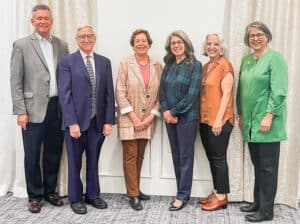
“Dismantling Ageism: How Stereotypes, Prejudice and Discrimination Based on Age Affect Us All” was the theme of the Eighth Annual Symposium organized by the Ruth Frost Parker Center for Abundant Aging at United Church Homes, held Oct. 6 in Columbus, Ohio. The day-long event was led by four experts in the forefront of cutting-edge efforts in gerontology and anti-ageism work.
Following a welcome by Larke Recchie, director of the Ohio Association of Area Agencies on Aging, and an introduction by the Rev. Dr. Kenneth Daniel, CEO of United Church Homes (UCH), the keynote address, “Ageism Unmasked,” was delivered by Dr. Tracey Gendron, chair and associate professor, Department of Gerontology, and executive director of the Virginia Center on Aging, at Virginia Commonwealth University.
Gendron, a developmental gerontologist, studies aging of people in a holistic fashion — biological, psychological, social and spiritual. Her speech first centered in on aging as a fluid, vital, vibrant process. “People talk about aging as ‘them,’ and not us,” she said. “We’re all aging every moment. When we ‘other’ what it means to age, we’re feeding into the myth of aging as decline.”
But when we see “elderhood” only as decline and “other,” it’s easy to ignore ageism, discrimination based on age, Gendron added.
“As we age, we do experience decline — we’re mortal beings,” she said. “But that’s just one piece of what aging is.” Assuming that physical decline is the only part of aging is an ageist perspective that causes harm, both internally and externally.
Examples of negative external ageism can be applied to different age groups: “Boomers are out of touch”; or “Millennials ruin everything.” External benevolent ageism is slightly more insidious — for example, over-helping someone perceived as “old” when they haven’t asked for it. Societal institutions and attitudes are rife with ageist attitudes.
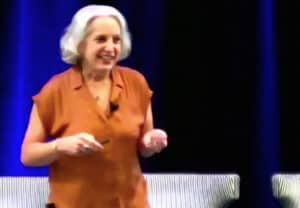
This can lead to ageism towards self — internalized ageism, said Gendron. As with other “isms” (e.g., racism, sexism, ableism, and the like), societal attitudes, what we see and hear in the media, and how we are treated by others can lead to internalized ageism. Even something as simple as “Oh, I don’t want to grow old” is an example of internalized ageism, she said. If an acquaintance says, “You haven’t aged a bit,” and the response is “Oh, thank you!” both parties have internalized ageism.
Gendron lifted up the current zeitgeist brought on by the institutional ageism inherent in the corporate and media-driven, anti-aging industry. “It is within the culture to ‘look and feel younger,’ the ageless issue, ‘look your youngest,’” she said. “Old hag versus young, beautiful princess.”
Decades of research about how we feel about our own aging matters to our health, said Gendron. Studies have shown, she added, that people who have internalized ageism have worse health, more depression, and have lifespans that average seven years less than people who are without the internalized stress of ageism.
“The stress we carry around when we try to ‘stay young’ helps to manifest the things we fear,” she said. Gendron’s own research has shown that fear of a future disability undergirds a fear of aging.
She reiterated, “Ageism is not inherent. Ageism is taught.” Ageism also has a negative impact on the health and well-being of older adults. And the intersection of ageism with ableism, racism, sexism and other “isms” magnifies the damage, she said. Gendron gave an example of such an intersection in a North Carolina study showing that people in a predominately white, more affluent neighborhood live 20 years longer than nearby neighbors in a less affluent, African-American neighborhood.
Studies also show that each year, $63 billion is wasted because of ageism in health care because of misdiagnosis, infantilization, overtreatment, and undertreatment. Patients who feel dismissed or infantilized in a doctor’s appointment are less likely to return to the doctor, said Gendron.
Another area where ageism affects outcome is in services and products for older adults. “There are many products and services,” Gendron said, “but are the companies asking older people what they want? Probably not.” New technology is an example — e.g., restaurants that use QR codes on the menu. Many people, including older adults, don’t know how to use the codes because the companies that developed the systems don’t provide training. It’s not that a particular group of people can’t use technology, she said; it’s that they were never provided training.
To combat ageism, we need to fundamentally change how we think about aging, Gendron said, and “we need to do it together.”
The key is to disrupt the process. Recognizing ageism is often the most difficult hurdle, she added, “but once you do, you can start to disrupt it. Disruption takes each one of us. It requires us to do something different than we did before.” The more people who disrupt, the more effective the change.
Gendron pointed to a three-step process in eliminating ageism. Taking time to think about ageism is the first step. Then comes evaluation: “How are my words or actions contributing to ageism?” “Is the thing I’m about to say or do ageist?” “Am I making an assumption or judgment based on age?” With that awareness, comes the power to act.
As an example, Gendron discussed some common terms that might not seem ageist at first glance: “That person has a young spirit.” De we really mean young, she asked? Or do we mean energetic, or a similar adjective. She encouraged attendees to use the more specific descriptors.
Internally as well, Gendron said, “say what you mean.” For example, “I feel so old.” If you say that, do you really mean tired? Or not well? Or perhaps, more positively, “long lived”? Remove the age-related description and say what you mean.
“When we say, ‘I’m 72 but I feel 40,’ the reality is that you do feel 72 because you are 72 — it’s just not what you expected,” added Gendron. “Remember: you are all the ages you’ve ever been and will become. We are all role models for aging.”
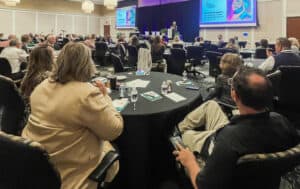
Following Gendron’s keynote were three presentations focused on specific parts of what Gendron addressed. Suzanne Kunkel, senior resource scholar at the Scripps Gerontology Center at Miami University, presented the AgeSmart Inventory, a resource to guide conversation and self-reflection. The inventory is designed for workshops and corporate training sessions on ageism. The questions, which can reflect lots of unresolved answers, lead to conversations on oversimplification and overgeneralization in ageism.
Kunkel raised humor about aging, and when — if ever — can it “just be a joke.” If the punch line has something to do with old being bad, the answer is no, she said. She noted that the exception is “in-group” humor, which can be a coping and resilience mechanism when all the people in the same group joke about it.
Following Kunkel, Richard Eisenberg, “unretired” journalist and podcaster who is the former managing editor of PBS’ Next Avenue and former executive editor of Money magazine, discussed ageism in today’s media. He discussed how health care professionals can help change ageism in the media. Research shows that only 4 percent of people cast in ads are over 60, and very few of the older adults are cast in roles of professionals. He suggested that social workers and executives in long-term care and support services can help gradually change that by being more visible in the media.
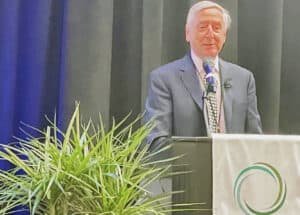
“Be more accessible to the media,” he suggested. “By doing interviews, you can dispel myths.” Eisenberg also encouraged executives to grant media access to clients, residents, and staff members for the same reason: to better understand the real lives of people, their struggles and joys, he said.
As Eisenberg’s talk ended, the Rev. Beth Long-Higgins, vice president of engagement for United Church Homes and director of the Parker Center, briefly introduced the National Center to Reframe Ageism’s video, “The Why and How of Reframing” and explained the research behind the reframing initiative.
The afternoon began with a presentation by Kris Geerken, co-director of Changing the Narrative, an anti-ageism initiative that brings evidence-based messaging and communication about aging and ageism to regional audiences. Geerken’s talk centered on societal (false) assumptions of aging. “We live in a society that tells us there’s one way of aging,” she said. “There are many.”
Building on Gendron’s opening keynote, Geerken reiterated that internalized ageism means feeling invisible, devalued, marginalized, overlooked, disrespected, and depressed. She cited a 2022 study by Becca Levy showing that ageism shortens lifespans, hinders recovery from health issues, accelerates cognitive decline, and increases anxiety and depression.
Because of the implicit bias against older adults in our society, Geerken said, even people who want to do something they’re interested in often don’t get offers because of inaccurate assumptions of frailty or cognitive impairment. We must change how we think and feel and act toward aging, she said.
Geerken gave examples of “elderspeak” and the damage it causes. Such phrases, often heard in health care toward older people, like “How are you today, Sweetie?” are examples of elderspeak. Elderspeak makes people feel incompetent, Geerken said.
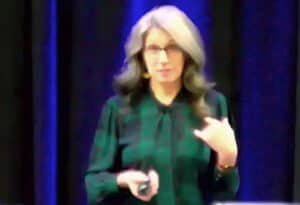
In adding to previous presentations on health care, Geerken discussed that health care officials often assume and omit instead of conversing with an older patient. She emphasized that depression, for example, is not a normal part of aging. “Not everything is attributed to you growing older,” she said.
She also discussed the intersection of isms. “Complicate ageism with race and ethnic identity, then socioeconomic status, and health care will be affected,” she said. “Getting your voice through is even more of a challenge. Multiple, intersecting oppressions (race, ethnicity, income, sexual orientation, ability, and gender identity) affect people and create inequitable treatment.”
To make health care more equitable, health care professionals need to create safe space and communicate that they are allies who will listen and not judge, said Geerken. Healthcare in a world without ageism is one in which age is respected, and not a criteria for treatment.
The final event of the day was a Q&A panel discussion with all four speakers on dismantling ageism. Moderated by Long-Higgins and Daniel, the panel discussed a variety of topics and methods for eliminating ageism.
Geerken reminded attendees to “approach with curiosity, not anger or aggression” when they hear an ageist remark. Make the conversation an opportunity to have future conversations, she said.
Kunkel agreed, saying that ageist remarks can be unintentional. “Often, it’s unintentional. If that’s the starting point, it helps me be gentler,” she said, and also reminded attendees to “express gratitude to those who are already making changes.”
“Reframe, don’t rebut,” said Long-Higgins. One example of reframing was then mentioned by Eisenberg. “I unretired from full-time work, not living,” he said. “you can be retired from a full-time job and still do things.”
Geerken agreed, and added that reframing “retirement” is one example of busting a stereotype.
The panelists then discussed the phrase “gerontocracy” — a media and political phrase picking up steam as the United States gears up for the 2024 presidential election — as a prime example of ageist thought being weaponized.
“It’s really important not to equate age and health, or age and competence,” Gendron said. “Gerontocracy is a manufactured tension. It’s lazy and easy, and distracts us from real problems. We need to focus on shared ideology, not age.”
At the same time, she added, there needs to be a sense of responsibility and accountability. If an elected official is not able to fulfill the requirements of their job anymore, they need to removed themselves from the position. The argument should be about capability, not age.
The panel addressed calls for action in its final discussions. The goal of anti-ageism should be “rooted in equity,” said Geerken. “Our goal should be equity, recognizing each individual as who they are.”
Gendron concurred, adding that the movement needs to be diversified. “When you look at the anti-ageism movement, overall, it’s comprised of middle-aged white women. We need more ethnicities, sexual and gender expressions, and others to bring their identities to it.”
She also linked anti-ageism to advocating for health care workers, stressing that direct care workers needed to be paid a living wage. “We have an industry dependent on direct care staff who are understaffed and underpaid,” she said.
Panelists agreed that advocates from various disciplines working for equity needed to find more ways to work together. The consensus was that crafting solutions to the multifaceted problems created by the intersection of oppressions needs all the voices working together.
Or as Gendron said, “Good things happen when we take the little steps. Movements happen when we all get on board. It’s more than just the language: to say what we mean, rather than what we easily understand, and to speak up when we hear microaggressions” can effect permanent change.
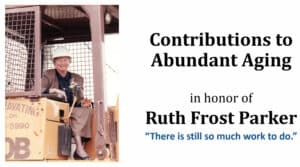
The symposium ended with a surprised Gendron receiving the Ruth Frost Parker Center of Abundant Aging’s Award of Distinction from Daniel. The award, in honor of the Center’s namesake, was given to Gendron in recognition of her distinctive contributions to the field of aging services and research. The late Ruth Frost Parker was a former United Church Homes Board member whose vision and generosity continues to inspire and impact others.
In receiving the award, Gendron thanked Long-Higgins, Daniel, her co-panelists, and attendees for their work. “You speak it so well and you live it so well,” she said. “There is nothing more meaningful than being acknowledged for the work you love to do.”
The 2024 Symposium takes place Oct. 4, 2024, and will focus on “The New Retirement: Meaning and Purpose Beyond Primary Careers.”
Join Our Mailing LIst
"*" indicates required fields
Follow on Facebook
Advocacy as a Ministry: A Call to Action for CHHSM Agencies - CHHSM
www.chhsm.org
At CHHSM, we know that advocacy is not separate from our ministry — it is ministry. It is the living out of our values in the public square. It’s standing in the gap for our neighbors, clients, ...